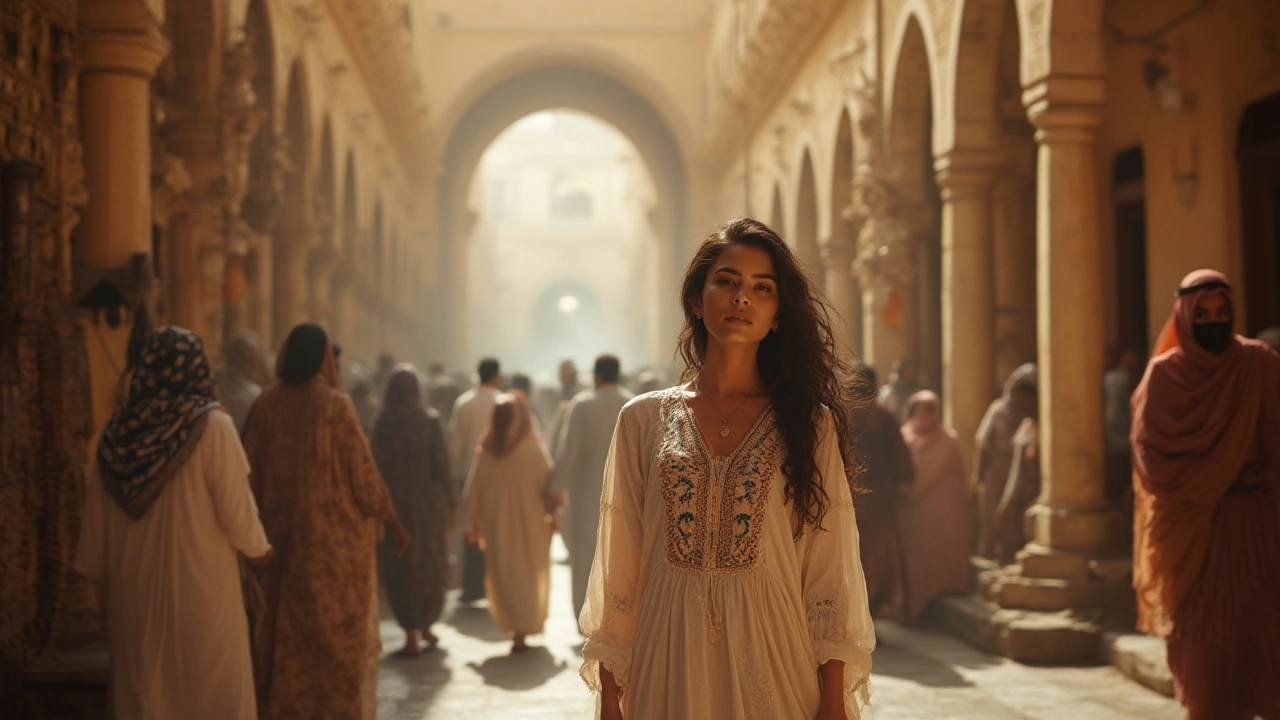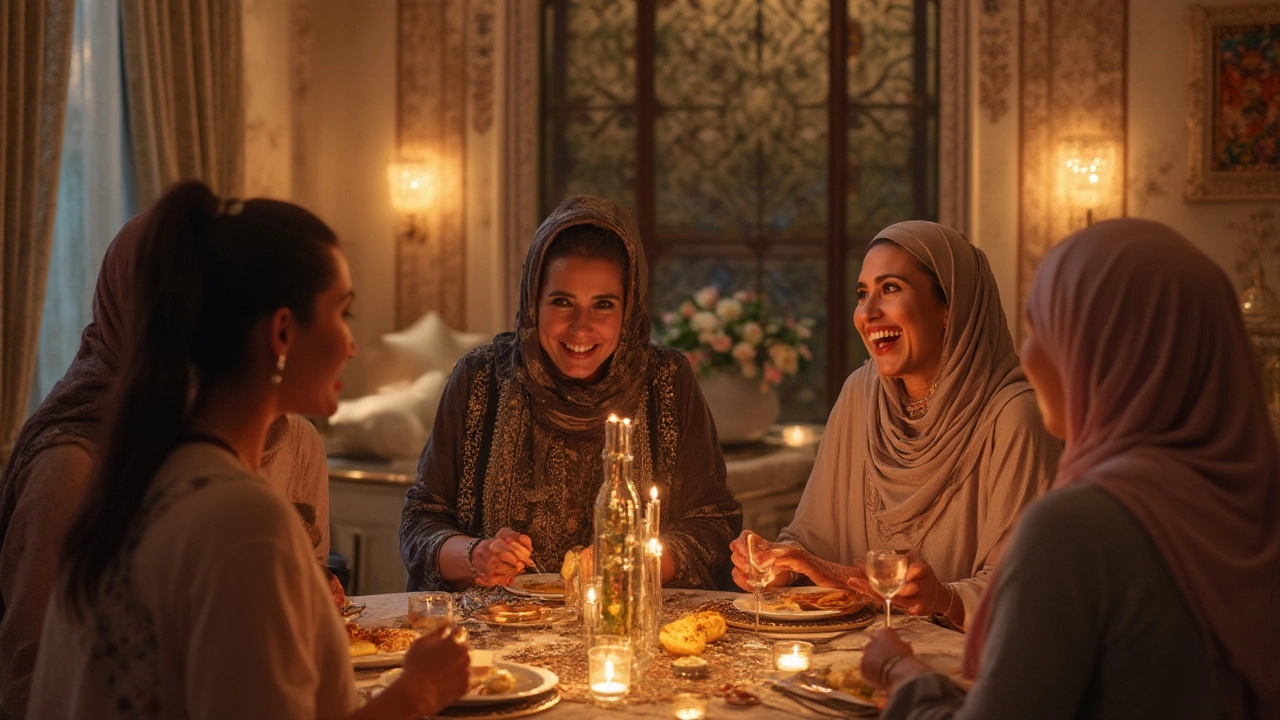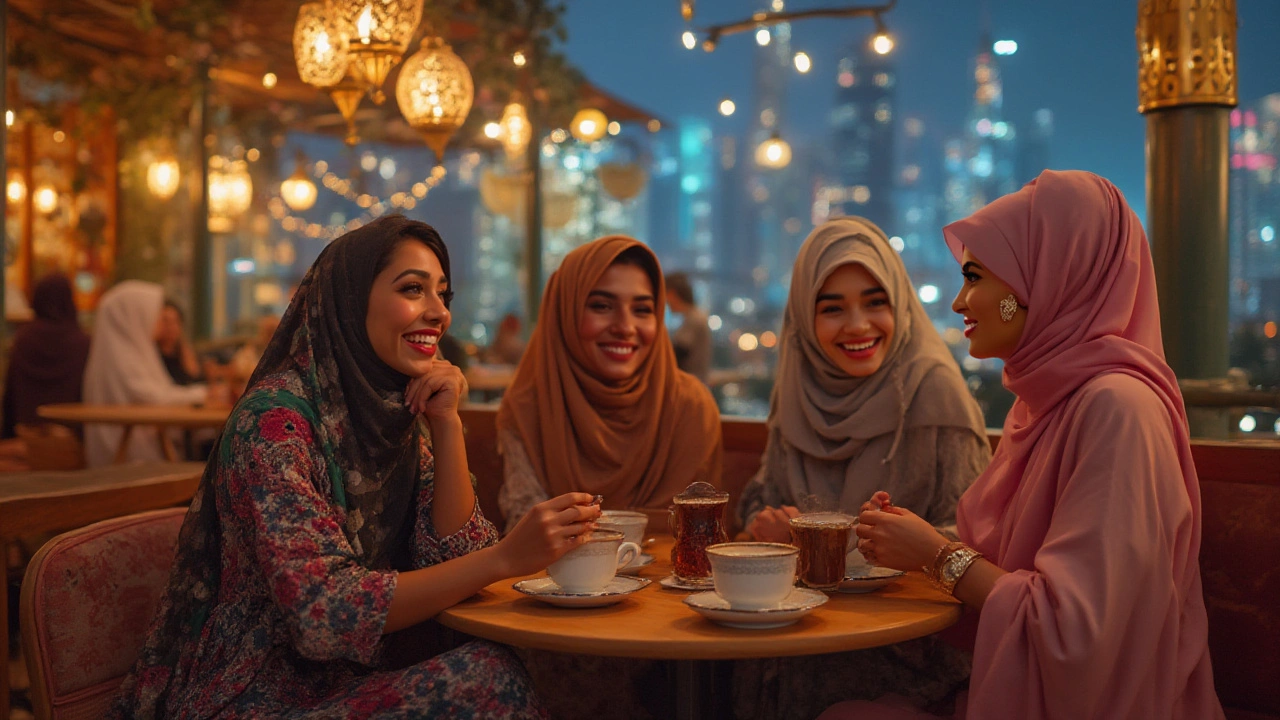The world still hangs on to a glamorized image of Dubai – a place where luxury has no ceiling, gold vending machines exist, and everyone’s Instagram is overloaded with brunches, beaches, and Burj Khalifa selfies. But that’s just the surface. Beneath this dazzling skyline, there’s a fascinating community making bold moves—Moroccan girls who have packed their lives, dreams, and sometimes whole wardrobes to start afresh here. If you think you already know what their life looks like, think again. The reality is as layered as the city itself. And trust me, it isn’t all perfumes and profiteroles.
Modern Moroccan Life in Dubai
Look around any café near Dubai Marina or Jumeirah, and you’ll spot the telltale signs – dark almond eyes, the sharp color-block hijabs, laughter that somehow sounds like music. Moroccan girls are adding something special to Dubai's social puzzle. The official stats back it up: as of 2025, more than 45,000 Moroccans live and work in the UAE, with a majority in Dubai. Among them, women make up a visible, dynamic group. This isn't just a wave—it's a tide.
What’s surprising? Moroccan girls in Dubai are not all following one playbook. Sure, some are students drawn by the city’s big-name universities and specialized training institutes. You’ll meet ambitious young women studying architecture, interior design, aviation, or hospitality. Emma, a 23-year-old from Casablanca, describes Dubai as "the Vegas of the Middle East," but with job opportunities that make her parents sleep easy at night. Meanwhile, others are hustling in salons, spas, cafes, or freezing in office towers as part of multinational companies. The stereotype of the "pampered expat" rarely fits – most Moroccan women in Dubai balance two jobs, run online side gigs, or share crowded apartments to afford the downtown zip code.
What about culture shock? It happens, but often in unexpected ways. Dubai is stricter than Morocco about some public behaviors and social spaces. Yet it’s also a place where going out at midnight for shawarma or shopping until sunrise feels perfectly ordinary. Moroccan expats catch on fast to this blend of freedom and rules. At Friday souks or open-air markets, they recreate Moroccan-style gatherings, sharing mint tea, debates on the best couscous spots, and music straight from the medina. Yet, these girls are more than flag-bearers for tradition. You’ll see them dancing at La Mer beach clubs or launching fashion pop-ups blending Berber patterns with modern edge. Dubai lets them be bold in ways that some never dared back home.
Family ties are another thread running deep. Moroccan culture puts a huge premium on family—so it’s common for young women to move to Dubai only if they have a cousin or aunt already in the city. There’s real courage in those who make the leap solo, navigating paperwork, finding decent landlords, and adapting to a food scene where even the hummus can taste wildly different from what they know.
Trouble fitting in? Less than you might expect. The Moroccan sense of humor is sharp but playful, and Dubai’s residents—who hail from over 200 countries—tend to be curious rather than closed. Sometimes though, Moroccan accents get mistaken for Lebanese or Egyptian, which can either be a running joke or a minor frustration. But mixing with other expat groups, from Filipinas to Russians to South Africans, means Moroccan girls often become savvy cultural mediators. They pick up slang in three languages and can navigate both Arabic and French circles like pros.
Yet, the expat life isn’t always a fairytale. Homesickness hits hard for some, especially during Ramadan or big family events. Skype and WhatsApp calls become lifelines. Some Moroccan girls get together to cook traditional dishes or host Netflix marathons with Arab soap operas to beat the blues. This support network, partly built offline and partly through countless WhatsApp groups, is a vital trick to thriving as a stranger in this metropolis.
Now, a practical tip: for those thinking of joining this growing scene, bring as many official documents as you can, and make certified Arabic or English translations back in Morocco. Paperwork here moves at lightning speed—sometimes, but not always, in your favor.

Daily Realities: Work, Safety, and Myths
Let’s get straight to a topic that rarely gets spoken about honestly—staying safe and earning respect in Dubai workplaces and social circles. For a lot of Moroccan girls, the biggest challenge is not landing a first job. It’s navigating a culture that’s both hyper-modern and deeply traditional at once.
There are rumors about Moroccan women’s reputation in Dubai, often fueled by viral stories, news headlines, or occasionally prejudiced whispers. It’s essential to say this upfront: The reality for most Moroccan women here is defined by their earning power and resourcefulness rather than any stereotype. Since the 2010s, Dubai authorities have cracked down on visa abuse and social misconduct, so the city now feels safer, but also more demanding of proof and paperwork from single young women.
Here’s what you’ll want to know: Most employers in Dubai, whether in hospitality, corporate settings, or the retail trade, clearly spell out boundaries. Contracts are detailed, HR departments are sharp, and complaint procedures are actually useful—if you use them right. However, as a Moroccan expat, especially in female-dominated spaces like beauty salons or customer-facing jobs, you’re likely to meet a barrage of questions about your background. It isn’t always negative. Some clients gush about Moroccan beauty traditions, ask for tips on argan oil, or want to hire you as a private chef for their home parties. Take advantage of that curiosity—it can be your ticket into bigger circles and side gigs. On the downside, there can be intrusive questions or unwanted attention. Learning to set gentle but firm boundaries is crucial here. It helps to have a trusted manager or female colleagues you can check in with until you’re fully comfortable with local etiquette.
How do Moroccan girls protect themselves in a city known for its extreme contrasts? Awareness, community, and a bit of streetwise attitude. It’s common to set up rideshares with friends after late shifts, avoid unknown neighborhoods, and double-check apartment listings to dodge scams. Official crime rates against women are low, but like anywhere, there are stories that travel by word-of-mouth. One trick? Use the Dubai Police app—it lets users instantly report issues and is available in English, Arabic, and even French.
Of course, not everything is predictable in Dubai, least of all salaries. Here are some 2025 figures that give the real picture—Moroccan women working as office assistants or beauty technicians in Dubai typically earn 4,000 to 8,000 AED per month. Fashion jobs and restaurants sometimes pay lower, while managerial and tech roles go much higher, especially if you bring niche skills from home. Living costs? A realistically tight budget for a shared room, basic groceries, phone, and daily travel sits around 3,200 AED per month. Saving up or sending money home takes real self-control, but it's doable. A lot of Moroccan expats move to Dubai on the promise of career acceleration (and there are more success stories than cynics expect). But keep in mind, after three years or so, the biggest achievement many will tell you about isn’t a job title. It’s mastering the art of resilience in a city that never eases up its pace.
Let’s talk dating and social rules, since everyone quietly wonders about it. Dubai isn’t as conservative as Riyadh or as wild as Beirut, but the code is strict enough—public displays of affection are frowned on, and sharing flats with partners is technically illegal without marriage. Moroccan girls usually find creative ways to socialize: they go to open-air cinema nights, rooftop shisha bars, friends’ home parties, and city art exhibitions. If you’re searching for love (or just friendship), there are countless Moroccan groups on Facebook and Telegram, where events get planned in both English and Moroccan Arabic. Caution is wise—Dubai’s laws on relationships are less harsh post-2021, but privacy should still be treated like gold.
Speaking of golden chances—here's an inside tip: The Moroccan consulate in Dubai often hosts events with free legal advice, workshops about employment rights, and meetups for newcomers. Check their website or socials for the latest.
For those dreaming of becoming entrepreneurs or freelancers, Dubai’s startup culture is buzzing. Moroccan girls have set up cooking schools, modest fashion brands, nail art lounges, and even consulting collectives for new arrivals. It’s easier than you think to pool resources and network if you attend meetups at d3 (Dubai Design District), or join women’s entrepreneurship bootcamps. More than one Moroccan expat has gone from side hustle to successful business within a couple of years.
| Job Type | Average Monthly Income (AED) | Average Working Hours/Week |
|---|---|---|
| Spa Staff/Beauty Technician | 6,000 | 45 |
| Retail/Fashion Assistant | 5,000 | 50 |
| Call Center/Customer Support | 6,500 | 48 |
| Office/Admin or Secretary | 7,000 | 40 |
| Start-up/Entrepreneurship | Varies (avg. 8,000+) | 55+ |
One last piece of advice? Don’t trust anyone offering you the a "guaranteed job" or "luxury accommodation" especially if it’s only via Instagram or messaging apps. Dubai cracks down hard on scams, but it’s up to you to do your homework and only go through officially registered channels for visas and jobs.

Cultural Impact and Community Connections
You probably expect Moroccan girls to stick tightly together, but what’s interesting is how quickly personal networks grow beyond their home community. Language helps of course—Moroccan Arabic is a bridge to Gulf Arabic, and most also speak solid French and decent English. In work and private life, they end up mixing with Lebanese, Syrians, Tunisians, and even non-Arabs, becoming culture blenders by default. Instead of keeping to old scripts, they start rewriting them. Some organize Eid dinners for orphaned expats, others perform at community talent nights, or run Instagram pages on North African dialect humor. One Facebook group for Moroccan women in Dubai has over 18,000 active members posting everything from flatshares to fitness tips and emergency SOS calls.
Behind the scenes, there are all sorts of ways Moroccan girls support each other. It’s not uncommon to see informal "auntie squads"—older Moroccan women who help new arrivals with CV edits, driving lessons, or how to make it through the first tough winter Ramadan when Dubai feels cold and crowded. Younger women start WhatsApp threads to compare business ideas, swap Spotify playlists, or help each other avoid online scams. It’s not just about nostalgia, either. There’s a genuine drive to adapt and thrive, with plenty eager to give back to new expats or even local charity efforts for underprivileged migrants elsewhere in Dubai.
Culturally, Moroccan events are hot tickets. The annual Moroccan Cultural Day, held in Dubai’s Cultural Quarter, draws thousands. Think food fairs where you can eat real rfissa, not just the Instagrammable stuff, plus pop-up bazaars stacked with gold-threaded kaftans and handmade mint tea glasses. DJs spin raï and gnawa, while Moroccan cuisine regularly makes it onto "Best in Dubai" lists—yes, even in a city with Michelin-starred everything.
Learning to thrive here sometimes means unlearning stuff from back home. For instance, back in Fez or Agadir, everyone knows everyone’s business. But in Dubai, Moroccan girls get a taste of near-total anonymity. That can feel both freeing and lonely. Some describe it as a "blank canvas"—a chance to redraw boundaries, relaunch dreams, and make unlikely friends without worrying about what old neighbors might think.
There’s another unexpected upside: living in an international expat city often inspires deeper pride in Moroccan roots. Separated from home, many girls dive even deeper into their heritage, learning to cook staple dishes, brush up on Amazigh symbols, or teach local friends simple greetings in Darija. This double identity—global citizen and Moroccan at heart—becomes a big source of strength.
Of course, it isn't always wine and roses. Sometimes, competition or miscommunication causes friction, especially where money, flatshare feuds, or romantic interests overlap. But these dramas tend to be resolved through quick mediation (and, often, a really strong cup of coffee).
What's changing now is visibility. As more Moroccan girls in Dubai succeed—in jobs, businesses, or community roles—the old backstories are fading fast. The younger generation isn’t waiting for permission to join city life. Instead, they’re writing their own scripts, starting everything from culinary startups to book clubs to sports leagues. Every year, more stories surface in Emirati media and social feeds, putting a real face to a group that was once typecast by out-of-date rumors.
If you pull up the stats, in 2025, the Moroccan expat population in Dubai is about 55% female, a number that grew by almost 12% in the last three years. More women are arriving solo, more are landing scholarships or executive roles, and more are speaking out openly about their experiences online. This is changing the narrative about Moroccan expats, both here and back home. If you’re curious about the cultural waves they’re making, just look at how quickly Moroccan restaurants, argan oil hair salons, and pop-up fashion stalls have become city favorites, even among locals.
Maybe the most beautiful thing about Moroccan girls in Dubai is this dual power: the ability to feel at home almost anywhere, and the courage to shake things up wherever they land. Whether you only see them at a glitzy brunch or cross paths in a crowded metro car, look closer—there’s a story, a hustle, and a blend of old and new you won’t find anywhere else.
